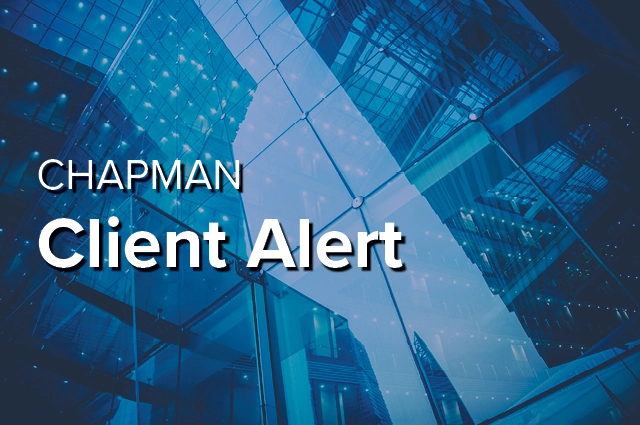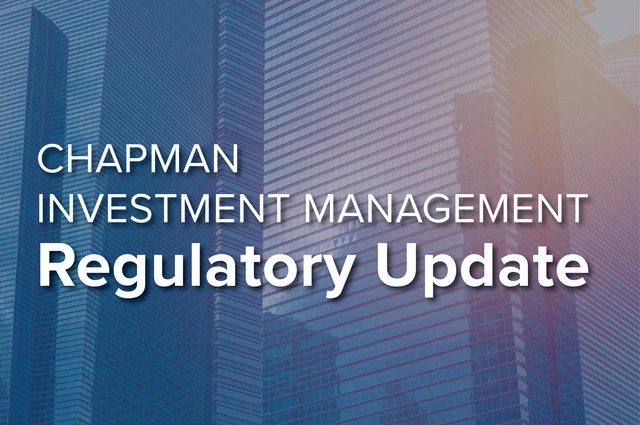Insights
Chapman and Cutler LLP mourns the loss of retired partner, colleague, and friend, Craig Fishman.
Changes are coming for health care organizations that are borrowers with respect to municipal securities. New data standards required under the Financial Data Transparency Act of 2022 (FDTA) could take effect as early as 2027. In the March/April 2025 issue of AHLA’s Health Law Connections, Chapman partners Mary Kimura and Hillary Phelps provide a summary of the FDTA and the joint standards proposed in August 2024, including reactions from municipal securities industry participants and a look ahead at the next stages of the rulemaking process. They also explore potential impacts of the new data standards on health care organizations and systems.
On March 7, 2025, the Office of the Comptroller of the Currency (“OCC”) issued Interpretive Letter 1183, which confirms that national banks may engage in certain crypto-assets activities and reverses the previous requirement that they first obtain a supervisory non-objection letter before engaging in such activities.
As reported in our recent series of Client Alerts, the Corporate Transparency Act (“CTA”) and the U.S. Department of the Treasury’s (the “Treasury Department”) Financial Crimes Enforcement Network’s (“FinCEN”) related beneficial ownership information (“BOI”) reporting rules have been the subject of a multitude of lawsuits, injunctions and announcements.
Chapman welcomes Liz Boison to our Compliance, Regulatory and Payments Group. A former federal prosecutor and bank regulatory enforcement attorney, Liz leverages her financial regulatory counseling and litigation experience to help clients prevent and resolve criminal and civil anti-money laundering (AML), sanctions, and consumer protection matters.
The Digital Chamber released a new report: "Beyond Merit: How the SEC's Division of Investment Management Blocked Permissible Investments in Digital Assets." The report seeks to provide a workable framework to turn historical Division of Investment Management actions regarding digital assets into a path forward for the increased availability of digital assets in investment company products. Chapman's Rick Coyle and Morrison Warren assisted in the preparation.
The National Credit Union Administration (NCUA) has released its 2025 Annual Performance Plan, outlining its strategic priorities, resource allocations, and regulatory focus for the fiscal year. This plan is built around three primary goals: ensuring a safe, sound, and resilient system of cooperative credit that safeguards consumers; enhancing financial well-being through access to equitable and affordable financial products and services; and optimizing organizational performance to effectively fulfill the NCUA’s mission. While the NCUA will remain centered on these primary goals, the shifts in federal administration in Washington, in particular among financial regulatory agencies, may signal potential changes to the NCUA priorities and this Plan.
On February 17, 2025, in light of the Supreme Court’s grant of a stay in the Texas Top Cop Shop case, the District Court stayed the nationwide preliminary injunction of the CTA issued in Smith v. U.S. Department of Treasury. As a result, the BOI reporting rules are now once again enforceable and in effect.
Chapman's quarterly Regulatory Update contains an overview of the latest regulatory actions, market happenings, and litigation and enforcement activity in the investment management space.
The US derivatives markets are renowned for their depth and innovation, drawing participants from across the globe. These markets have a long‑established history of trading futures contracts on US Treasury securities, US and non‑US stock indexes, and physical commodities, as well as listed options on these instruments. In recent years, new types of contracts based on novel asset classes and indices have emerged. Examples of these new asset classes include cryptocurrencies, volatility, environmental attributes, and macroeconomic indicators. In addition to listed contracts, over‑the‑counter (OTC) derivatives may be executed bilaterally and either submitted for clearing or maintained as bilateral transactions if they are not subject to mandatory clearing requirements.

- Topic: NYSE
1 match.
On February 22, 2023, the New York Stock Exchange (“NYSE”) proposed the adoption of new listing standards contained in the Corporate Governance section of the NYSE Listed Company Manual (the “Manual”). New Section 303A.14 would “require issuers to develop and implement a policy providing for the recovery of erroneously awarded incentive-based compensation received by current or former executive officers.”








